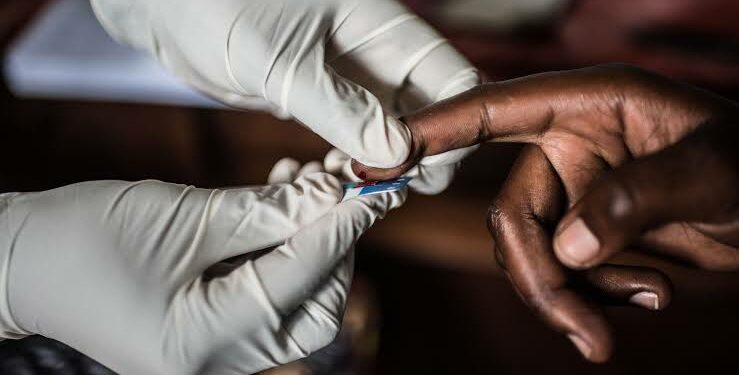By Michael Kanaabi Dollar
The HIV Aids scourge while not an existential threat any more like it was about 30 or so years ago in Uganda is still here with us and can be hazardous to whoever lives their sexual life carelessly whether they have already acquired it or not.
Current Status of HIV Aids in Uganda
Recent reports on the status of HIV Aids between 2022 and 2024 show prevalence has stagnated at around 5.1% with in the national adult population a remarkable decline from it’s 30% peak prevalence levels in the mid 1990s.
New infection rates according to the Uganda Aids Commission have reduced from 83000 in 2010 to 38000 as of 2024. Deaths are down from 52000 annually a decade ago to 17000 and infection rates among newly born babies are down from 30,000 a year to 4700 over the same period.
However laxity, neglect, increased urbanisation, the lure for quick money has pushed up infection rates in newly emerging cities like Mbarara where concerned practitioners in the HIV Aids sector have raised alarm over rising infection numbers especially among young ladies between 18 and 24 years engaging in commercial and cross generational sex largely making up the higher prevalence numbers in these locations which are at about 11%.
What is being done to fix the surge?
Prevention of new infections has remained a challenge especially among adolescent girls, young women and other marginalized groups but efforts are underway to achieve the UNAIDS 95-95-95 target by 2025.
This target aims at ensuring 95% of those living with the virus know their status, 95% of those with the virus are put on treatment and 95% of those on treatment achieve viral suppression.
The mid term review of the National HIV Aids strategic plan 2021/2021-2024/2025 shows a number of interventions including voluntary male circumcision nationwide, increased prevention of mother to child transmission, widespread social and behavioral change communication campaigns, expanded access to HIV testing and treatment with 97% of those on medication having a viral load test in recent times.
What is HIV/AIDS?
According to Senior Gynaecologist Dr. Godfrey Habomugisha of Teamwork Homecare Services HIV (Human Immunodeficiency Virus) is a virus that attacks the body’s immune system, specifically CD4 cells (T cells). AIDS (Acquired Immune Deficiency Syndrome) is the most advanced stage of HIV infection.
How is HIV transmitted?
Dr. Habomugisha says “HIV/Aids is primarily transmitted through having unprotected sex with an infected person. This sex can be oral, vaginal or anal.”
Other modes of transmission for HIV Aids include sharing needles or syringes contaminated with infected blood, mother to child transmission during pregnancy, childbirth or breastfeeding, blood transfusion from an infected donor although this has largely been contained as blood is pre-checked multiple times before transfusion and occupational exposure mainly for healthcare workers through accidental needle pricks he notes.
What causes HIV/AIDS?
It is caused by the Human Immunodeficiency Virus according to Dr. Richard Lukandwa of Teamwork Homecare Services, “ This virus destroys the CD4 cells in the hand body weakening a person’s immune system. The virus also replicates and mutates rapidly making it difficult for the immune system to fight it.”
How can HIV/AIDS be prevented?
Medical Professional Julius Habumugisha also CEO of Teamwork Homecare Services says safe sex practices are very critical in the prevention of HIV Aids.
“ Using condoms when having sex, using dental dams for oral sex and taking pre-exposure prophylaxis for those operating in high risk environments of acquiring the virus can help one prevent it.”
Avoiding needle exchange, using new and clean needles and syringes for medical procedures only once and disposing them off can help curb the spread of HIV.
Habumugisha says testing regularly to know your status and that of your partner can also be effective in controlling the spread of the virus.
Antiretroviral treatment for infected persons also helps keep their viral load down and control the risk of further spread of the virus.
For those who have been exposed to the Virus, home based medical services provider Teamwork Homecare Services CEO Habumugisha advises you get emergency medication as soon as possible a service Teamwork Homecare will be providing soon too.
Technically known as Post-exposure prophylaxis, it does play a great part in preventing one from acquiring the disease.
For breastfeeding mothers, they are advised to find alternatives like putting their babies on strictly formula milk and keeping off breastfeeding he adds.
Can HIV/AIDS be cured?
Dr. Richard Lukandwa Says there is no cure for HIV Aids yet however Antiretroviral therapy suppresses the virus’s replication slowing down progress of the diseases and degeneration of the patient.
He adds that Antiretroviral therapy can also render the virus undetectable in the blood preventing transmission as a result emphasizing the mantra Undetectable=Untransmitable.
Treatment options
Teamwork Homecare Services’ Dr. Lukandwa says the major treatment given for HIV Aids currently is Antiretroviral therapy combination of various medications that do suppress the virus and slow progression.
For very aggressive variants of HIV Aids, Highly Active Antiretroviral therapy is recommended to bring the disease under control he notes.
Entry inhibitors are also administered to prevent HIV Aids from entering the human body cells.
Integrase inhibitors are also given in a number of instances to block HIV from integrating into its host’s DNA.
Support and alternative treatment
When it comes to alternative therapies, Medical Professional Julius Habumugisha recommends plant stemcell therapy which he says can help the body create more healthy white blood cells, rid the body of dead cells and toxins, boost immunity and help the body fight off the HIV Aids better.
Other recommended nutritional supplements for HIV Aids patients include Vitamin B,C and E supplements, omega 3 fatty acids, probiotics and antioxidants.
Ginseng, garlic, St. John’s wort, grape extract, green tea extract and selenium can also help fight off HIV Aids.
Ongoing Research
Researchers are currently exploring various vaccine options with trials in advanced stages for some and already completed for others according to Teamwork Homecare’s Dr. Godfrey Habomugisha.
Gene editing research which aims at eliminating the HIV DNA completely is also being undertaken he says.
Stem cell transplant research which can provide potential cures to HIV Aids through bone marrow transplant is also ongoing.
Teamwork Homecare Services CEO and Medical Professional Julius Habumugisha advises all to stay vigilant the fight against HIV Aids by staying informed, practising recommended preventive measures including regular testing which can be done in the convenience of your home or office by Teamwork Homecare Services and being supportive to those affected by HIV Aids in order to completely have the disease under control.
Email: michaelkanaabi@gmail.com
WhatsApp : +256701133509
Do you have a story in your community or an opinion to share with us: Email us at editorial@watchdoguganda.com













